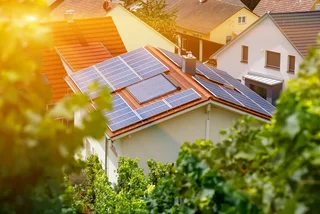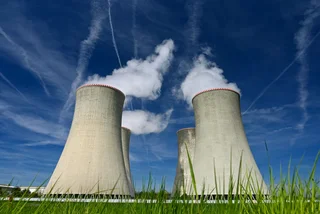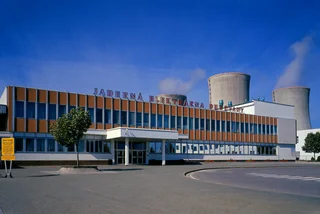Energy company ČEZ and the Czech state have secured storage capacity in a liquefied natural gas (LNG) terminal in the Netherlands that will reduce dependence on Russian gas by roughly one-third. The Czech state still must secure gas to store in the terminal. When filled, gas from the terminal will extend gas consumption in the Czech Republic by one and a half to two months, Minister of Industry and Trade Jozef Síkela said.
The terminal at Eemshaven, Netherlands, is still under construction and will go into service in September. Renting the storage capacity will cost the Czech Republic tens of millions of crowns per year, but the exact amount was not disclosed by ČEZ.
PARTNER ARTICLE
Gas reserves in the Czech Republic are now approximately 77 percent full, enough to cover consumption until approximately January. With the use of the capacity from the Dutch terminal, the Czech Republic would probably last until March.
Annual gas consumption in the Czech Republic amounts to about 9.4 billion cubic meters of gas, according to Síkela, roughly 98 percent of which comes from Russia.
“We have ensured the Czech Republic will have the possibility of processing 3 billion cubic meters of gas in this terminal every year. This is approximately a third of the total volume of gas we imported from Russia. Together, we have also secured new transport capacities for the state, through which we will transport gas to the Czech Republic,” Síkela said.

According to Síkela, it will be possible to transport up to 1.5 billion cubic meters to the Czech Republic during the upcoming heating season.
"Europe is currently trying to increase the possibilities of importing gas from countries other than Russia. Thus, new LNG terminals are being built that will be able to receive gas from overseas. There is now logically a great interest in LNG, and the Czechia, which has no sea, needs to secure capacity in one of the coastal states for the needs of energy security and ensuring gas supplies for its citizens and businesses. And now, in cooperation with the ČEZ group, we have succeeded," Síkela said.
ČEZ is now negotiating with various LNG suppliers to secure as much liquefied natural gas as possible for the upcoming heating season. The gas is liquefied after extraction so that it can be transported more easily by tankers. According to ČEZ CEO Daniel Beneš, it will take 30 tankers to carry 3 billion cubic meters of gas.
Síkela stated that the Czech Republic now has about two-thirds of its annual gas consumption secured. The need will be addressed not only in the upcoming, but also in the following heating season. The reservoirs will have to be filled again after the winter. Now it continues to be filled with gas that comes from Russia.

ČEZ CEO Beneš said securing the storage was an important step on the way to returning to safe energy supplies at affordable prices for Czech citizens and Czech companies.
“ČEZ has a large team of highly experienced experts who trade in energy all over Europe. We took advantage of their knowledge and thanks to our expertise we obtained both the capacity in the terminal in Eemshaven and the necessary transport routes. In this way, we are purposefully continuing our strategy to get rid of energy dependence on Russia – from nuclear fuel to supply companies to gas," Beneš said.
The terminal with a total annual capacity of 8 billion cubic meters of gas is being built in the port of Eemshaven in the province of Groningen in the north of the Netherlands.
Liquefied natural gas will be brought to the terminal on specially modified tankers. The liquid will then be heated there and converted into a gaseous state. This gas then will be sent from the terminal into gas transport pipelines.
The terminal will consist of two floating storage and regasification units (FSRUs): the Exmar S188 and the Golar Igloo vessels. In addition to ČEZ, it will also be used by Shell and other companies, ČEZ said in a press release.












 Reading time: 3 minutes
Reading time: 3 minutes 































